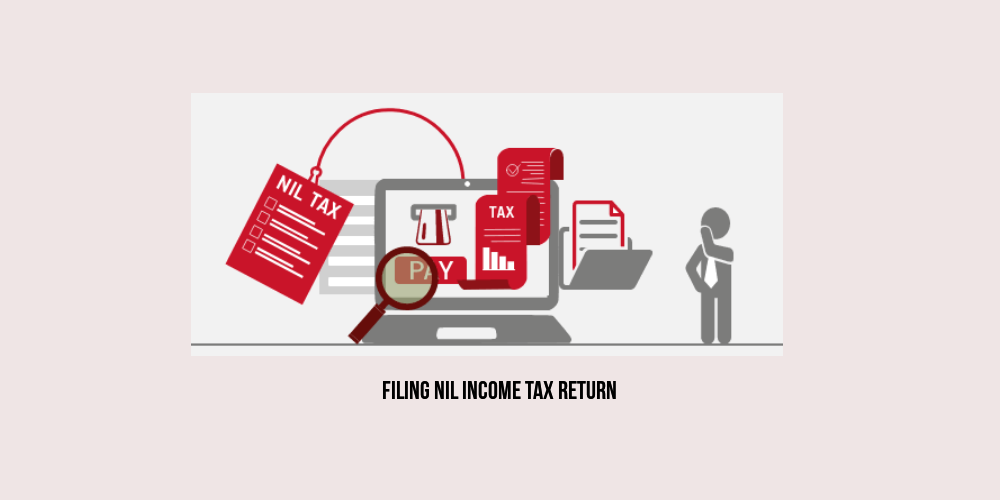Filing income tax returns is a mandatory process for every taxpayer in India. It allows the government to assess an individual’s income and determine the applicable taxes. However, not everyone is aware that even if they have zero income or fall below the taxable threshold, they are required to file a “Nil Income Tax Return” (NIL ITR). In this blog, we will explore the various advantages and importance of filing a NIL ITR in India.
What is Nil Income Tax Return?
A Nil Income Tax Return is filed when an individual has no taxable income or when their income is below the basic exemption limit set by the government. Even if a taxpayer falls into this category, they must still inform the Income Tax Department by filing a NIL ITR. This process is crucial as it helps the government maintain accurate records and identify non-taxable individuals.
Benefits of Filing Nil Income Tax Return
1. Compliance with the Law
One of the significant benefits of filing a NIL ITR is that it ensures compliance with the tax laws of India. The Income Tax Act mandates that all eligible taxpayers, including those with no taxable income, must file their returns. By doing so, individuals contribute to a transparent and accountable tax system, promoting the country’s economic growth.
2. Establishing Financial Records
Filing a NIL ITR helps in creating a financial trail with the Income Tax Department. This record becomes vital when applying for loans, visas, or any other financial transactions that require proof of income or tax compliance. It enhances the individual’s financial credibility and makes future financial dealings smoother.
3. Claiming Refunds on TDS
Even if an individual’s income is below the taxable limit, they may have faced tax deductions at source (TDS) on certain income sources like fixed deposits or interest on savings accounts. By filing a NIL ITR, they can claim a refund for the TDS deducted, putting their hard-earned money back into their pockets.
4. Carry Forward Losses
In some cases, taxpayers may have incurred losses in a financial year due to various reasons, such as business losses or capital losses. Filing a NIL ITR allows them to carry forward these losses to subsequent years, offsetting them against future income. This provision can prove beneficial when the taxpayer’s income exceeds the basic exemption limit in future years.
5. Avoiding Penalties
Failure to file a tax return, even if there is no tax liability, can attract penalties from the Income Tax Department. By submitting a NIL ITR within the specified deadline, individuals can avoid such penalties and legal consequences.
6. Supporting Documentation for Visa Applications
When applying for certain types of visas, especially for foreign travel or immigration, the host country often requires an applicant to furnish proof of financial stability and tax compliance. A NIL ITR serves as valuable documentation in such cases, facilitating a smooth visa application process.
7. Financial Planning and Loan Applications
Filing a NIL ITR is particularly advantageous for individuals who foresee an increase in income in the future. It establishes a financial history and can aid in long-term financial planning. Additionally, when applying for loans or credit cards, lenders may request previous tax returns as part of their evaluation process, making a NIL ITR submission necessary.
8. Contributing to the Nation’s Progress
Filing a NIL ITR is not just an individual responsibility; it is a contribution to the nation’s progress. It helps the government in better budget planning, resource allocation, and policy implementation for the welfare of its citizens.
Steps in Filing Nil Returns
Filing a NIL ITR is a relatively simple process. Here are the steps to follow:
Registration: If not already registered on the Income Tax Department’s e-filing portal, create an account by providing necessary details.
Select Appropriate Form: Choose the correct ITR form for filing a NIL return. In this case, it would be the form designated for individuals with no taxable income.
Enter Personal Details: Fill in personal information such as name, PAN (Permanent Account Number), address, and contact details.
Income Details: Provide details of income sources, even if the income is zero. This may include income from salary, house property, business, capital gains, or other sources.
Tax Deducted at Source (TDS): Enter any TDS deducted during the financial year, even if it is eligible for a refund.
Bank Account Details: Mention the bank account details where the tax refund, if any, will be credited.
Verification: Complete the verification process, either electronically or by sending a signed physical copy to the Income Tax Department’s Centralized Processing Center.
Conclusion
Filing a Nil Income Tax Return in India is not only a legal obligation but also a prudent financial practice. It offers several benefits, including compliance with tax laws, financial credibility, TDS refunds, and the ability to carry forward losses. Moreover, it establishes a positive financial history and contributes to the nation’s growth. As responsible citizens, let us fulfill our duty and file NIL ITRs even when our income falls below the taxable limit. Remember, a small step towards tax compliance can lead to significant advantages in the long run.




